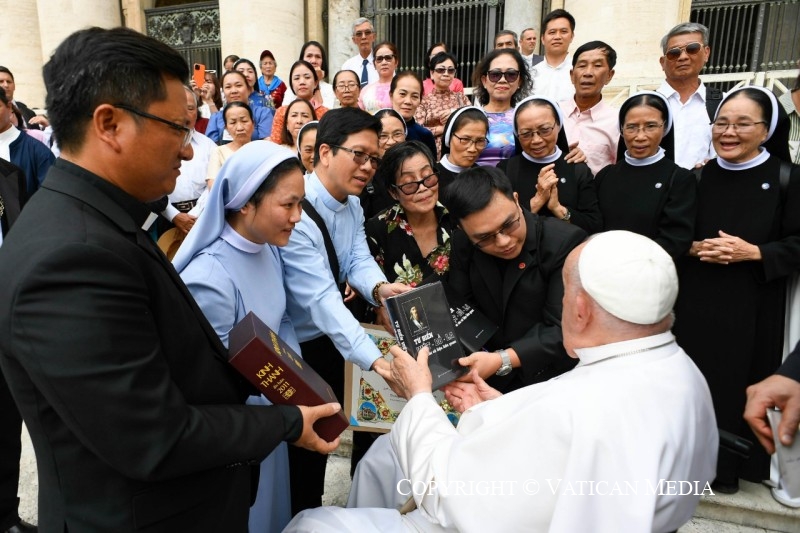Pope: Let us always pray for the Chinese people, great in courage and culture
At the general audience the Pope paid homage to China by greeting the Association of Friends of Card. Celso Costantini, builder of bridges between East and West. A thought also for the Refugee Day that the UN will celebrate tomorrow: "States should work to offer humane conditions and integration". The catechesis dedicated to the psalms: "There is no state of mind that does not find in them the best words to transform them into prayer".
Vatican City (AsiaNews) - "We always pray for the noble Chinese people, so courageous and who have such a beautiful culture". From St Peter's Square Pope Francis returned today to express his fondness for China, inviting all the faithful to pray for the "dear Chinese people".
The occasion for these words was the presence among the pilgrims present at the general audience of a delegation from the Association of Friends of Card. Celso Costantini, which in the diocese of Concordia-Pordenone keeps alive the memory of this great man of the Church who exactly a century ago promoted the celebration of the first (and so far only) Chinese Council in Shanghai.
Just tomorrow in Rome, the new volume 'Cardinal Celso Costantini and China. Builder of a 'bridge' between East and West' - published by Marcianum Press and commissioned by the Association that bears his name - which is introduced by a preface by Card. Secretary of State Pietro Parolin, in which he writes that Card. Costantini 'traced out a direction, on which the Church continues today'.
In his greetings to the faithful, Francis also recalled the World Refugee Day promoted by the United Nations, which will be celebrated tomorrow. "May it be an occasion to turn an attentive and fraternal gaze," he said, "to all those who are forced to flee their homes in search of peace and security. We are all called to welcome, promote, accompany and integrate those who knock on our doors. I pray that States will strive to ensure humane conditions for refugees and to facilitate integration processes'.
He then invited - as he does every week - to continue to pray for peace, citing the tormented Ukraine, the Holy Land, Sudan, Myanmar "and wherever people are suffering from war. Let us pray every day for peace'.
In his catechesis - continuing the cycle of reflections on the Holy Spirit - Francis had dwelt on the "symphony of prayer" that is the book of psalms. "They are the songs that the Spirit himself put on the lips of the Bride," he explained, recalling their different "movements": "praise, thanksgiving, supplication, lament, narration, sapiential reflection, and others, both in the personal form and in the choral form of the whole people."
"The psalms had a privileged place in the New Testament," he recalled. And while it is true that "not all the psalms - and not all of every psalm - can be repeated and made their own by Christians", sometimes reflecting a historical situation and a religious mentality that are no longer our own, "they have been the prayer of Jesus, of Mary, of the Apostles and of all the Christian generations that have preceded us. When we recite them,' Francis commented, 'God hears them with that grand 'orchestration' that is the communion of saints'.
We cannot, however, just live off the legacy of the past: that is why the pope invited us to "make the psalms our prayer". "If there are psalms, or just verses, that speak to our heart, it is good to repeat them and pray them during the day," he explained. "There is no state of mind or need that does not find in them the best words to transform them into prayer. Unlike all other prayers, the psalms do not lose their effectiveness by dint of repetition; on the contrary, they increase it. Why? Because they are inspired by God and 'breathe' God, every time they are read with faith".
"If we feel oppressed by remorse and guilt," the pontiff exemplified, "we can repeat with David: 'Have mercy on me, O God, in your love; / in your great mercy' (Ps 51:3). If we want to express a strong personal bond with God, we say: 'O God, you are my God, / from dawn I seek you, / my soul thirsts for you, / my flesh longs for you / in a dry, thirsty, waterless land' (Ps 63:2). And if fear and anguish assail us, these wonderful words come to our rescue: 'The Lord is my shepherd. Though I go through a dark valley, / I fear no evil' (Ps 23:1, 4)".
"The psalms," the pope concluded, "allow us not to impoverish our prayer by reducing it only to requests. They help us to open ourselves to a less self-centred prayer: a prayer of praise, of blessing, of thanksgiving. And they also help us to make ourselves the voice of all creation, involving it in our praise".
21/05/2024 22:04







.png)










